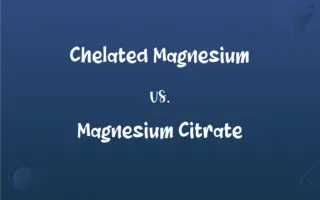Hardening vs. Quenching: What's the Difference?
Edited by Harlon Moss || By Janet White || Published on January 4, 2024
Hardening is the process of increasing the hardness of a material, often metal, while quenching is a rapid cooling step in hardening to achieve desired properties.

Key Differences
Hardening is a metallurgical process used to increase the hardness of metals, typically by heat treatment. Quenching, a crucial step in the hardening process, involves rapidly cooling the heated metal, often in water or oil.
The purpose of hardening is to make metals more resistant to deformation and wear. Quenching achieves this by altering the metal's microstructure, typically resulting in increased strength and brittleness.
Hardening processes vary depending on the metal type and desired properties, but generally involve heating the metal to a specific temperature. Quenching, following the heating, rapidly reduces the temperature, 'freezing' the structural changes in place.
The effectiveness of hardening depends on factors like temperature and time at which the metal is held during the process. Quenching mediums, like oil, water, or air, influence the cooling rate and thus the final characteristics of the metal.
Post-hardening, metals often undergo further treatments to adjust properties like toughness. After quenching, tempering is commonly performed to reduce brittleness while maintaining the increased hardness.
ADVERTISEMENT
Comparison Chart
Primary Purpose
Increase metal's hardness
Rapidly cool metal to set microstructure
Process Involvement
Overall heat treatment process
Specific step within hardening
Temperature Consideration
Heating to a specific temperature
Rapid cooling from high temperature
Impact on Material
Increases resistance to wear and tear
Alters microstructure, increases strength
Subsequent Processes
Often followed by tempering
Precedes tempering or other treatments
ADVERTISEMENT
Hardening and Quenching Definitions
Hardening
Involves heating materials to a high temperature and then cooling.
The blade underwent hardening to ensure its sharpness and longevity.
Quenching
Used to lock in the properties achieved by heat treatment.
After heating, quenching the metal fixed its new characteristics.
Hardening
Used to improve the mechanical properties of an alloy.
The hardening treatment significantly increased the alloy's tensile strength.
Quenching
A step in metallurgical processing to achieve desired hardness.
Quenching was crucial in obtaining the specific grade of steel required.
Hardening
Increasing the hardness and strength of a metal through heat treatment.
The hardening process made the steel much more durable.
Quenching
Rapid cooling of a hot metal in water, oil, or air to set its microstructure.
Quenching the steel in oil enhanced its hardness.
Hardening
A method to make materials more resistant to deformation.
Hardening the aluminum alloy improved its performance in aerospace applications.
Quenching
Influences the final properties of the metal, like strength and brittleness.
Quenching the blade made it stronger but also more brittle.
Hardening
A process to enhance the wear resistance of metals.
Hardening the gears resulted in a longer lifespan for the machinery.
Quenching
Stops the high-temperature processes occurring in the metal.
Quenching the metal quickly prevented unwanted structural changes.
Hardening
The act or process of becoming hard or harder.
Quenching
To put out (a fire, for example); extinguish.
Hardening
Something that hardens, as a substance added to iron to yield steel.
FAQs
What is hardening in metallurgy?
It's a process to increase the hardness and strength of metals.
What is quenching?
Quenching is rapidly cooling heated metal to set its microstructure.
What is the role of quenching in hardening?
Quenching rapidly cools the metal to lock in the hardening process's effects.
Can all metals be hardened?
Most steels and some other alloys can be hardened, but not all metals.
What are the mediums used for quenching?
Common quenching mediums include water, oil, and air.
Is quenching always necessary in hardening?
Yes, quenching is an essential step in most hardening processes.
How does hardening affect a metal?
It makes the metal more resistant to wear and deformation.
What's the difference between hardening and tempering?
Tempering follows hardening to reduce brittleness while maintaining hardness.
Is hardening a reversible process?
No, once hardened, the metal's structure is permanently altered.
Why is controlled quenching important?
To ensure desired mechanical properties and prevent defects.
Are there environmental concerns with quenching mediums?
Some mediums, especially oils, can have environmental impacts.
Can quenching cause cracking in metal?
Rapid cooling in quenching can sometimes cause thermal stresses and cracks.
How does the quenching medium affect the metal?
Different mediums control the cooling rate, affecting the metal's properties.
Can hardening increase a metal's brittleness?
Yes, hardening often increases both hardness and brittleness.
What determines the effectiveness of quenching?
The cooling rate, medium, and metal type determine quenching's effectiveness.
Is there a risk of warping during hardening?
Yes, uneven heating or cooling can cause warping.
Can quenching be done at room temperature?
Quenching typically involves higher temperatures and rapid cooling.
How do industries test for successful hardening?
Hardness tests, like the Rockwell test, measure the effectiveness.
Can both processes be automated?
Yes, modern metallurgy often automates both hardening and quenching.
Does hardening affect the weight of the metal?
No, it changes the microstructure, not the mass.
About Author
Written by
Janet WhiteJanet White has been an esteemed writer and blogger for Difference Wiki. Holding a Master's degree in Science and Medical Journalism from the prestigious Boston University, she has consistently demonstrated her expertise and passion for her field. When she's not immersed in her work, Janet relishes her time exercising, delving into a good book, and cherishing moments with friends and family.
Edited by
Harlon MossHarlon is a seasoned quality moderator and accomplished content writer for Difference Wiki. An alumnus of the prestigious University of California, he earned his degree in Computer Science. Leveraging his academic background, Harlon brings a meticulous and informed perspective to his work, ensuring content accuracy and excellence.






































































